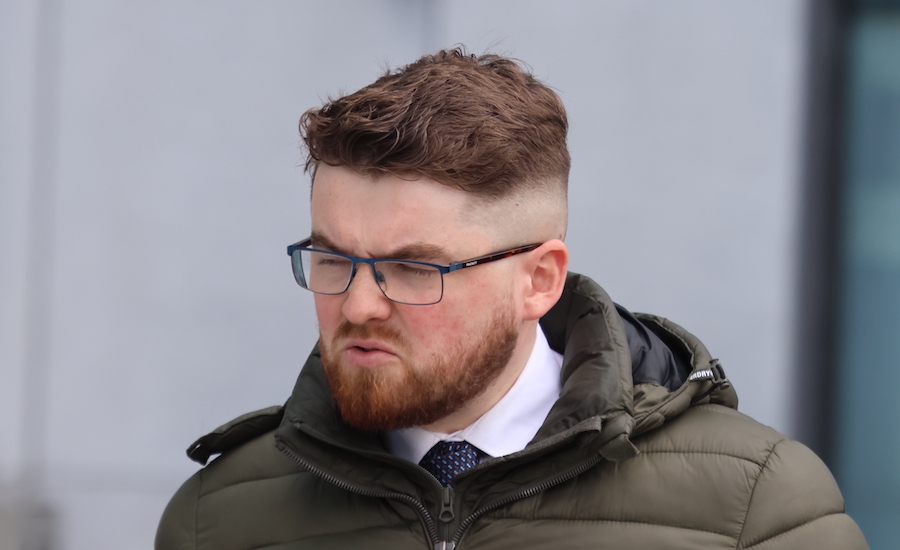A drink-driving case against a serving Garda from Donegal has been dismissed as no evidence was given in court about the time of the alleged driving.
Judge Éiteáin Cunningham dismissed the case involving Matthew Dougan at Letterkenny District Court on Thursday.
A breath test on Dougan showed that he was twice the legal limit after being arrested by gardai, who found a red Volkswagen Golf overturned on the road at Kiltoy, Letterkenny, on May 6, 2022.
However, the 29-year-old of Ashfield, Letterkenny contested the charge and his solicitor, Mr Frank Dorrian, argued that no proof had been given for the time of driving.
The case first came before Letterkenny District Court on July 3 and was adjourned to allow the Judge consider the evidence and submissions.
Judge Cunningham said that Mr Dorrian submitted to the court that there was no evidence of the time of Dougan’s driving, which was accepted by everyone to be “an essential proof”.
The court previously heard how Garda Ciaran McGinley received a report of a road traffic collision at Kiltoy at 11.55pm.
Detective Garda Kilgar Porter told how he observed a red Volkswagen Golf overturned on the road when he arrived at the scene around midnight.
Detective Garda Porter said he detected a strong smell of alcohol from Dougan, who was “slurring his words and his eyes were glazed”.
Detective Garda Porter recalled how he asked Dougan if he had been driving and he stated that he was. He told how he asked Dougan if he had been drinking and he stated that he was.
Dougan was arrested and made no reply when cautioned.
At Letterkenny Garda Station, a breath test showed concentration of 57 microgrammes of alcohol per 100 millilitres of breath, where the legal limit is 22mg of alcohol per 100ml of breath.
State Solicitor for Donegal, Mr Kieran Dillon, said the facts were clear that a Garda received a call, dispatched a car and that Dougan was present at the roadside with fresh debris at the scene.
Mr Dillon said that Dougan admitted to Detective Garda Porter that he was driving.
“In all of the circumstances, regarding an assessment of the situation at the time of driving, the court can infer that the driving was within a three-hour period,” he said.
Mr Dorrian said that the court was being asked to arrive at a situation where something ‘must’ have happened or is ‘likely’ to have happened.
“The time frame for the taking of such samples is within three hours of so driving,” Mr Dorrian said. “There is a necessity to prove the time of driving.
“These are essential proofs in the prosecution of driving in excess of the limits. Not by conjecture, there must be other evidence to confirm how it happened and when it happened.”
Mr Dorrian submitted to the court that there was an “equality of arms situation” at play.
Mr Dillon argued that the Detective Garda had a conversation to establish facts after finding a vehicle overturned and debris at the scene. He said the incident “must have been contemporaneous”.
Mr Dorrian submitted to the court that “there is no getting away from the fact that essential proofs in drink-driving cases are the time of driving and the fact of driving. There is no other finger pointing here such as ‘I heard a loud bang’ or ‘the vehicle was warm’.”
Mr Dillon had said that the road in question was “well travelled”, something that was borne out by the gardai remaining at the scene for traffic management purposes. Mr Dillon said the court could “infer” a time of driving by the evidence submitted.
Judge Cunningham said that the court “does not have the time of driving nor can the court, on the evidence presented, infer a time of driving”.
Judge Cunningham told the parties that had she heard evidence from the caller who rang the garda station, or heard an audio recording of the call, or the accused been asked about the time, or evidence given about the state of the car such as ‘the car was warm or there was steam coming out of it’, then “it would have been a very different position”.
Judge Cunningham added: “To infer a time of driving from photos of debris, or the fact that gardai remained at the scene or that a call was recorded, bearing in mind there was no evidence of the call, is impossible. The court has no option but to dismiss.”








